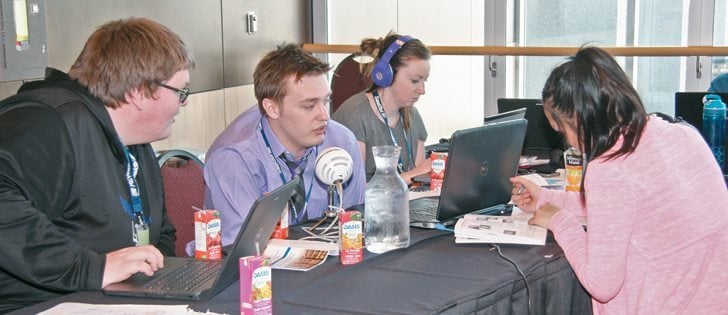GILBERT PLAINS, Man. — Christopher Manchur will enter the University of Manitoba’s college of agriculture next month better off than many of his rural classmates.
Community service and strong marks made him a candidate for numerous scholarships that will pay for most of his first-year expenses.
That’s especially helpful for the 18-year-old from Gilbert Plains, who grew up more than 300 kilometres from Winnipeg and must live away from home for the four years it will take to complete the degree program.
“Getting these scholarships helps me to keep on top of my impending debt,” he said of scholarships that range from $3,000 from the University of Manitoba to $2,500 from the Canadian Agri-Business Education Foundation to $1,500 from Farm Management Canada.
Read Also

Know what costs are involved in keeping crops in the bin
When you’re looking at full bins and rising calf prices, the human reflex is to hold on and hope for more. That’s not a plan. It’s a bet. Storage has a price tag.
Manchur credited rural communities for supporting youth, citing a number of scholarships received locally from his town of 750 residents.
He was active in sports, served as a youth member on town council and worked summers at the Gilbert Plains Consumers Co-op, building grain bins.
Now he can bank that income.
“I can put the money I’m making now into my future instead of paying off school,” said Manchur, who hopes to work in agriculture next summer to increase his chances of finding employment after graduation.
He said most of his friends will take out loans or rely on parents to fund their education.
Others are enticed to bypass school for a weekly paycheque and start working now, but Manchur wants to follow in his agronomist father’s footsteps.
He looks to a career in agricultural biotechnology, helping farmers grow bigger and crops grow hardier and more disease resistant.
“It’s difficult for some to look into the future and understand that financial difficulty now may prove beneficial in the future,” he said.
Mandy Mail, director of student services for RBC, advised students to create a budget to determine how much money they will need to get through the year.
“We can spend too much money on coffee,” she said, citing the need to track expenses.
“You have more control over your finances than you think.”
Access registered education savings plans, scholarships, bursaries and government loans with favourable payback terms. Also, take advantage of student discounts and offers available from businesses.
“They are quite prevalent and can help reduce costs in many aspects of life, from food to clothes to movies,” Mail said.
Banks are the final option. They can offer lines of credit and student credit cards without annual fees.
“Be aware of what things are costing and where your money is going,” said Mail, who also advised students to pay off credit card bills monthly. These practices can help youth better understand practical money management skills as they move toward toward independence, she said. “You learn a lot but when you graduate you may know a lot about the topics you’ve studied but you may not feel real world ready.”
For more information, visit rbcadvicecentre.com.















